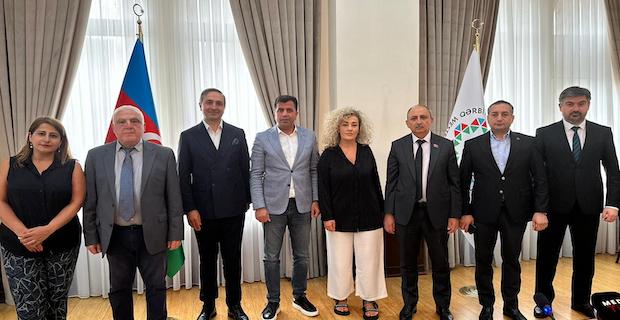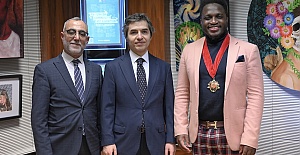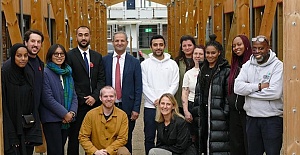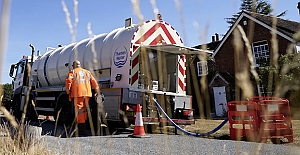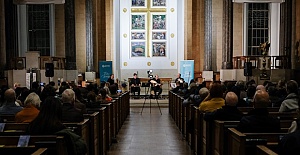West Azerbaijan Community hosted international journalists from different countries of the world in Baku.Journalists from England, Georgia, Albania and Turkey attended the meeting held at the West Azerbaijan Community building on August 26, 2023.Aziz Alakbarov, Chairman of the Board of the West Azerbaijan Community (AZERTAC), informed international journalists about the Karabakh conflict, historical facts, geopolitical interests and the solution process…Alakbarov emphasized that Azerbaijan is ready to live in peace with the Armenians, but Armenia does not take kindly to this, and noted that they will tell the world the facts about the Karabakh conflict and historical facts, together with their evidence.
“The Western Azerbaijan Community calls on Armenian Prime Minister Nikol Pashinyan to refrain from false propaganda, slander and manipulation against Azerbaijan.”
Alakbarov said “Armenia has been ignoring UN Security Council resolutions for 30 years, acting as if such resolutions ‘did not even exist.”
The West Azerbaijan Community and other civil society organizations of the Republic of Azerbaijan appealed to the international community.
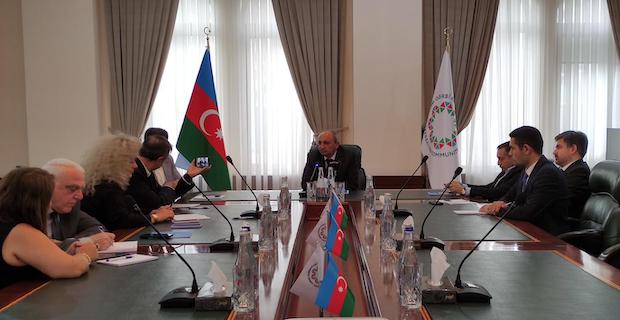
"Throughout the tumultuous 20th century, Armenia mercilessly subjected ethnic Azerbaijanis to unspeakable horrors, unleashing displacement and various forms of persecution that inflicted profound suffering and indelible scars on their memories.The brutal expulsion of Azerbaijanis from Armenia between 1987 and 1991 marked the appalling conclusion of a century- long campaign to eradicate them from what was once their ancestral homeland. The Azerbaijani settlements in Armenia, which were once flourishing cradles of Azerbaijani culture, lay abandoned yearning for their rightful owners.As if this malevolence were not enough, the 1991-1994 occupation of Azerbaijani territories by Armenia brought an even darker chapter of suffering. Approximately 800,000 Azerbaijanis were savagely uprooted from their homes, forced into a cruel fate of displacement. Cemeteries and sacred places of Azerbaijanis were demonstratively destroyed, desecrating their cultural legacy and inflicting irreparable wounds.The brutality of Armenia knew no boundaries. It carried out numerous massacres against innocent Azerbaijani civilians, claiming the lives of over 20,000 souls. To this day, the fate of 4,000 missing individuals remains a haunting agony, a painful reminder of the unresolved grief and suffering endured by the Azerbaijani people.In tent camps, hundreds of thousands of Azerbaijani refugees and IDPs endured unimaginable living conditions, devoid of basic services. This prolonged displacement, tore families apart, wrought havoc upon their social fabric, leaving them grappling with despair and uncertainty.For years, Armenia brazenly defied international law, clinging to its occupation and preventing the safe return of Azerbaijani IDPs. Only in the Autumn of 2020, when Azerbaijan liberated its occupied territories while countering yet another vicious attack by Armenia, did the IDPs finally glimpse a glimmer of hope to return home.Yet, the road to rehabilitation and reintegration has been paved with unprecedented challenges and hardships. With cruel intent, Armenia left the once-occupied territories heavily contaminated with landmines, rendering vast swaths of land uninhabitable deathtraps. With blatant disregard for human life, Armenia refuses to reveal the location of these hidden seeds of death, attacking the very essence of the international humanitarian law.
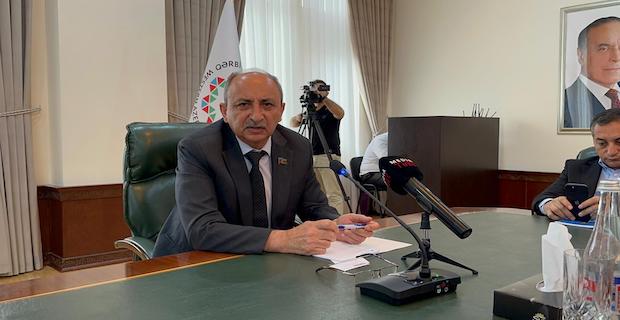
The world's response to the unprecedent injustice inflicted upon ethnic Azerbaijanis has been nothing short of disheartening, exposing glaring double standards in addressing human rights issues. Despite the gravity of Armenia's heinous actions, the global community has turned a blind eye, failing to afford the Azerbaijani plight the empathy and support it so desperately deserves.The selective approach of the so-called "international community" is a disheartening display of bias and indifference, evident in their disregard for the immense suffering endured by the Azerbaijani people. They seem to prefer to conveniently forget the plight of ethnic Azerbaijanis, who have faced displacement, persecution, and massacres. Instead, attempts are made to shift focus towards non-existent and fabricated "potential" problems of Armenians residing in the Karabakh region of Azerbaijan.One of the disconcerting hoaxes perpetuated is the portrayal of the area of Azerbaijan, where Russian peacekeepers are temporarily deployed, as something exclusively related to ethnic Armenians, deliberately obscuring the painful truth of the past. The fact is that Azerbaijanis were brutally expelled from multiple settlements in that very area, including from Khankendi, Karkijahan, Malibayli, Garadaghly, and Khojaly. The haunting memories of the 1992 massacre in Khojaly, where Armenian forces orchestrated a mass killing of Azerbaijani civilians, still reverberate, leaving scars difficult to heal. The displaced Azerbaijanis are still unable to return to those settlements. Such a misleading narrative, painting a picture of exclusivity for the Armenian population, only serves to perpetuate an unjust and divisive approach.
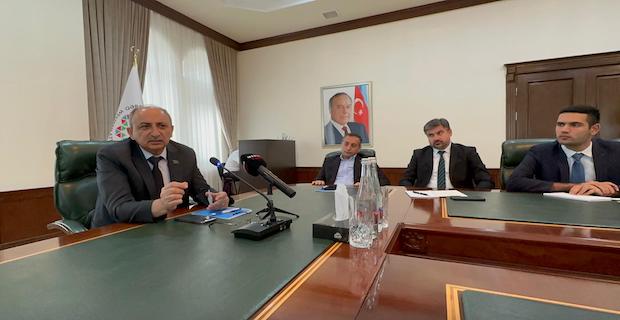
This lopsided view exposes the true colors of those who claim to uphold justice and human rights, as they blatantly ignore the rights and hardships of Azerbaijanis, fueled by ethnic and religious considerations.Such a stance endorses Armenia's war crimes, crimes against humanity, and racial discrimination, allowing injustice to prevail and perpetuating the cycle of suffering for the Azerbaijani people.Buoyed by this preferential treatment, Armenia persists in its arrogance, denying the right of expelled Azerbaijanis to return to their rightful homes. They shamelessly label the forced expulsion as "voluntary," a perverse attempt to strip Azerbaijani refugees of their fundamental right to return. Armenia's persistent refusal to engage in dialogue with the Western Azerbaijan Community regarding the safe and dignified return of Azerbaijanis expelled from Armenia, while labeling their legitimate cause as a mere "territorial claim," serves as yet another troubling testament to this state's adherence to a mono-ethnic policy and its deep-rooted Azerbaijanophobia.Furthermore, Armenia's assertion of the "exclusivity of Karabakh Armenians" echoes a deeply problematic and unsettling ideology, evoking historical parallels that should serve as a stark warning. Such a notion displays a dangerous belief in racial superiority and the exclusion of others based on ethnicity.The international community's failure to condemn Armenia’s misdeeds only reinforces the perception of pro-Armenia bias, leaving Azerbaijanis to bear the burden of injustice without the support they deserve.The displacement plight of ethnic Azerbaijanis stands as a haunting testament to humanity's capacity for cruelty and indifference. The scars inflicted upon the Azerbaijani people cry out for attention and action, demanding that the world unmask its double standards and confront these grave injustices head-onIt is high time for the international community to reflect on its actions, rectify its selective approach, and truly stand up for justice and human rights, regardless of ethnic origin or religion. Only then can we hope for a more equitable and inclusive world that rejects discrimination and embraces genuine peace and reconciliation."


 After Nesil Caliskan a by-election will be held in Jubilee ward in Enfield
After Nesil Caliskan a by-election will be held in Jubilee ward in Enfield Publishing the analysis, Labour’s Cllr Ergin Erbil said Everybody in Enfield deserves basic rights
Publishing the analysis, Labour’s Cllr Ergin Erbil said Everybody in Enfield deserves basic rights Gaza-Israel conflict Statement from Cllr Ergin Erbil, Leader of Enfield Council
Gaza-Israel conflict Statement from Cllr Ergin Erbil, Leader of Enfield Council Cllr Ergin Erbil was elected as the new Leader of Enfield Council
Cllr Ergin Erbil was elected as the new Leader of Enfield Council The European Union called on Turkey to uphold democratic values
The European Union called on Turkey to uphold democratic values Turkish citizens in London said Rights, Law, Justice
Turkish citizens in London said Rights, Law, Justice The Council of Turkish Cypriot Associations Geneva response letter
The Council of Turkish Cypriot Associations Geneva response letter Sustainable Development and ESG, Will This Become the Course for Turkic World
Sustainable Development and ESG, Will This Become the Course for Turkic World Saran Media And Euroleague Basketball Extend Media Rights Partnership for Four More Years
Saran Media And Euroleague Basketball Extend Media Rights Partnership for Four More Years Will Rangers be Jose Mourinho’s next victim?
Will Rangers be Jose Mourinho’s next victim? Jose Mourinho's Fenerbahce face Rangers on Thursday
Jose Mourinho's Fenerbahce face Rangers on Thursday Inzaghi stated that they felt the absence of our national player Hakan Çalhanoğlu
Inzaghi stated that they felt the absence of our national player Hakan Çalhanoğlu Barclays has become the biggest UK lender so far to cut mortgage rates
Barclays has become the biggest UK lender so far to cut mortgage rates THE SPRING STATEMENT EXPLAINED, UK ECONOMIC OUTLOOK AND GROWTH FORECASTS
THE SPRING STATEMENT EXPLAINED, UK ECONOMIC OUTLOOK AND GROWTH FORECASTS Launch of Made in Enfield gift shop to celebrate local artists and designers
Launch of Made in Enfield gift shop to celebrate local artists and designers Trial used smart Wi-Fi sensors for live building occupancy data to optimise
Trial used smart Wi-Fi sensors for live building occupancy data to optimise





